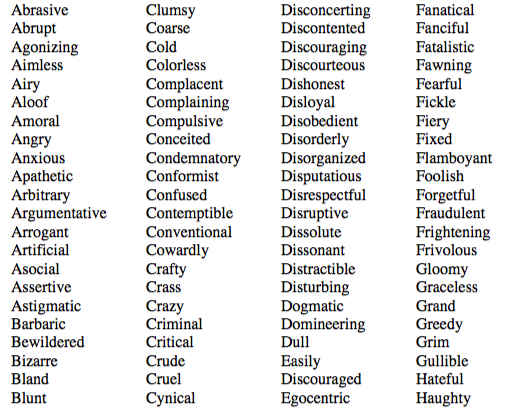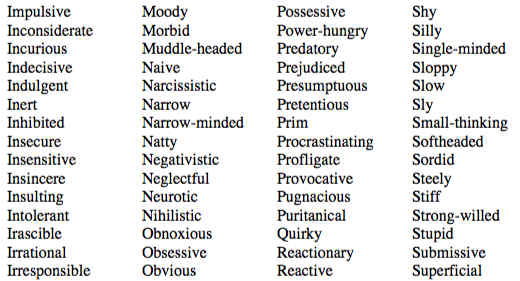Use of negative personality adjectives

Below is a short list of negative personality adjectives. The majority of people would consider the character traits described below to be "bad" or “negative”. However, "bad" or “negative” is defined by the culture in which one lives. For example, for a priest "aggressive" might be a negative trait while for a soccer player or salesman, it is usually a desirable trait. Associated Press Stylebook
Negative personality adjectives
- angry
- bewildered
- clumsy
- defeated
- embarrassed
- fierce
- grumpy
- helpless
- jealous
- lazy
- mysterious
- nervous
- obnoxious
- panicky
- pitiful
- repulsive
- rude
- scary
- thoughtless
- uptight
- worried
Have you tried the FREE PaperRater automated proofreader yet? What are you waiting for?

Sentences using negative personality adjectives
- Her successor was regarded as a bitter and angry woman.
- The teacher attempted to explain the solution to the math problem for one hour, leaving Lucie with a bewildered look.
- Who has not offered some bright object to a baby and watched its clumsy attempts to reach for it.
- He had a defeated attitude as he began his losing battle against Victor.
- Finally, she showed increased interest in the topic and the pained, embarrassed look had left her face.
- All the employees considered him to be a fierce tyrant.
- He arrived bereft of all of his possessions, a pitiful and grumpy old man.
- The helpless woman and child lived in a cabin in Arkansas.
- The jealous woman hated his Oxford friends.
- The lazy horse pulled the cart with us all at his accustomed slow pace.
- He was a nervous man, and he shuffled from one foot to the other as if the floor was hot.
- She was a rude, obnoxious woman, enough to drive a uptight man to despair.
- The shock DJ had been pulled from the air by the panicky manager.
- There were three repulsive fellows on board, I beleive they were professional gamblers.
- Cain was delighted with the gift, but some rude villagers tried to take it from him.
- He wanted to make a film with really scary clowns.
- I have been a thoughtless woman for a good many years.
- Memorable characters included a lazy schoolchild, a pitiful pop starlet, and a defeated middle-aged man.
More negative personality adjectives

Sentences using negative personality adjectives
- He was an apathetic writer and a worse psychiatrist.
- The aimless boy was seeking the approval of his older peers.
- He encountered a ruthlessly ambitious and amoral man.
- His mother was an attention seeking argumentative woman.
- She is known to be extremely arrogant woman.
- Dating a blunt woman can be difficult.
- She was a conceited woman.
- The crafty man concealed himself in an angel's form.
- She had become a crude woman, her hair badly dressed, her skirt awry, her hands red.
- The discourteous young man gave a bad reputation to his classmates.
- He was a discourteous fellow, who enjoyed to lounge about, giving advice to workmen.
- His happiness was short lived because he had a disobedient and disloyal wife.
- I ran when the fanatical woman suddenly came toward me with a knife.
- The Count of Monte Cristo was a mysterious, fanciful man.
- A woman must find value in herself, not in the next fawning man to come down the street.
- He was eventually banished from the village due to the fact he was such a fickle man.
- The frivolous woman lacks all sense of propriety and virtue.
Additional negative personality adjectives

